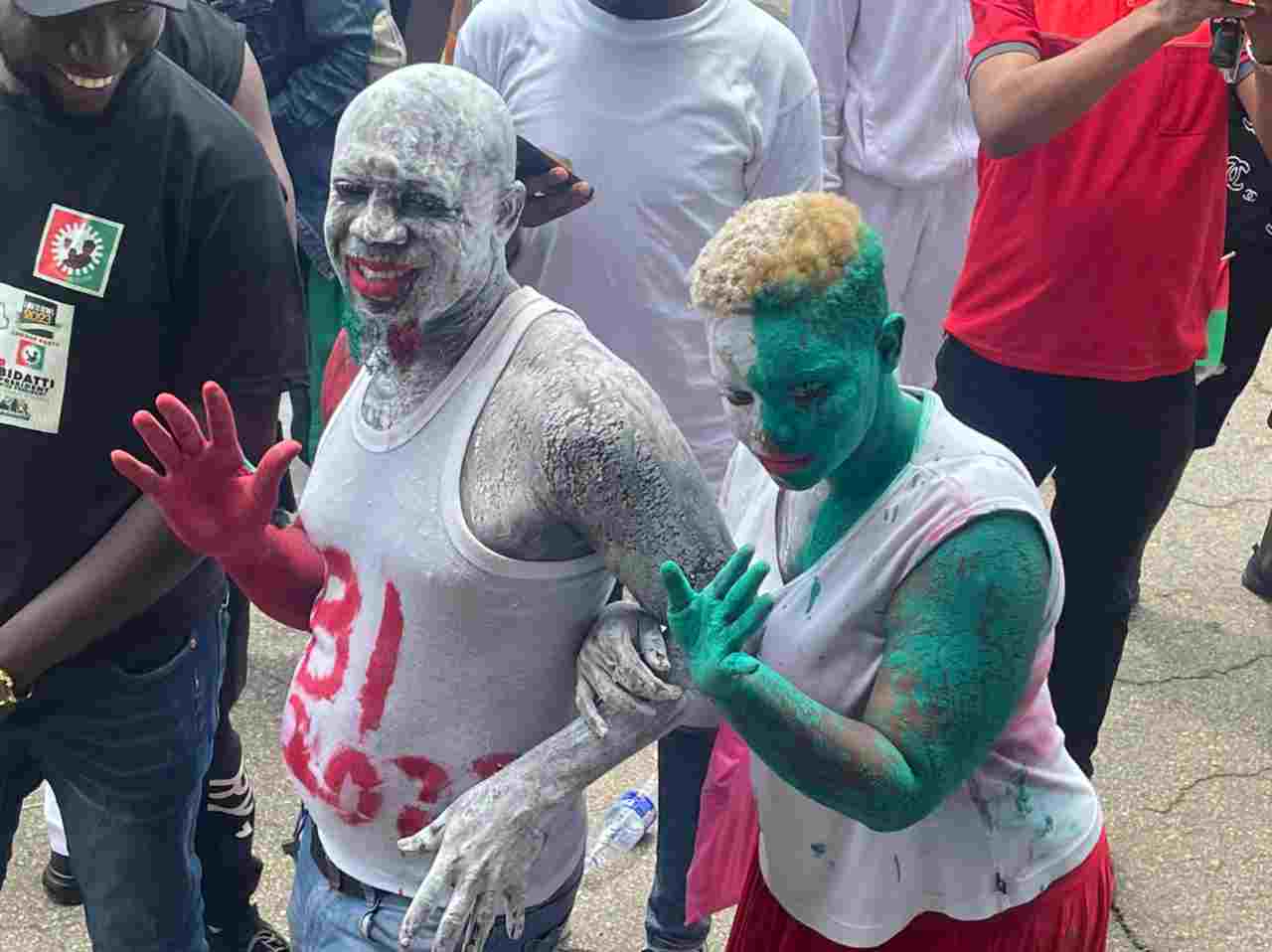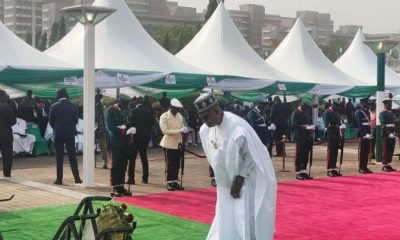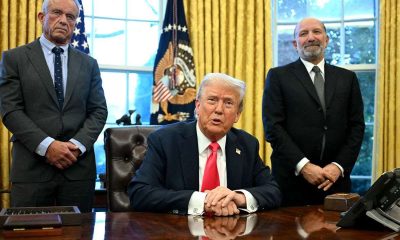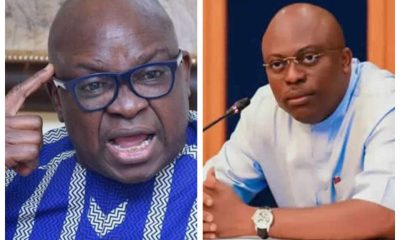Politics
2027: President Tinubu takes solid step for reelection
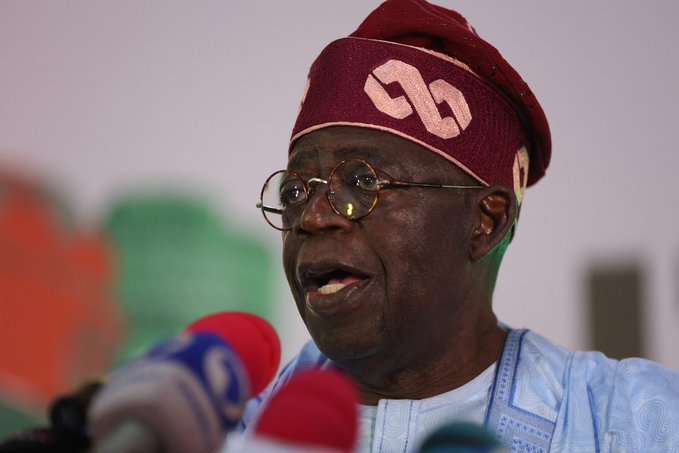
… Consolidates power in oil-rich South South
As Nigeria gradually approach the 2027 general elections, a silent but profound political earthquake is reshaping its political landscape. At the heart of this shifting terrain is President Bola Ahmed Tinubu, whose strategic consolidation of power is most visible in the oil-rich South South region — a traditional stronghold of the opposition Peoples Democratic Party (PDP).
With a combination of political deals, realignments, and calculated moves, Tinubu is systematically dismantling opposition fortresses in states like Delta, Rivers, and Akwa Ibom – the three big South South states in terms of both population and oil resources – setting the stage for what could be an unprecedented political hegemony.
The defection of Delta State governor, Sheriff Oborevwori, his predecessor Ifeanyi Okowa, and virtually the entire structure of the PDP in the state to the ruling All Progressives Congress (APC) marks a turning point. No longer are the South South states impregnable bastions of the opposition; they are rapidly transforming into strongholds of the APC under Tinubu’s deft maneuvering. But the critical question remains how events will play out, given the unpopularity of the APC among the mass of the people in the zone and beyond.
Delta, one of Nigeria’s wealthiest states owing to its abundant oil reserves, had since 1999 been a reliable PDP territory. The party’s dominance was almost taken for granted. However, internal crises, leadership squabbles, and the erosion of grassroots loyalty created cracks that Tinubu exploited.
The final blow came after months of strategic consultations culminating in a marathon meeting in Asaba, where Delta’s political heavyweights—Governor Oborevwori, former Governor Okowa, the PDP state chairman, the speaker of the House of Assembly, all local government chairmen, and major stakeholders—agreed unanimously to defect to the APC.
Senator James Manager, one of the state’s political pillars, captured the moment: “We cannot continue to be in a sinking boat. The PDP’s decline in Delta is irreversible.”
Delta State Commissioner for Information, Charles Aniagwu, used a vivid metaphor that has since gained traction: “The PDP is like palm wine whose taste has changed; hence, there was a need to change the drinking pattern.”
According to political analysts like Dr. Festus Aigbokhaevbo, a professor of political sociology at the University of Benin, the realignment is more about survival than ideology.
“Delta politicians have realized that fighting from the opposition could spell political irrelevance,” he explained. “Aligning with Tinubu ensures access to federal projects, protection from federal agencies, and political longevity.”
Local Politics
Indeed, factors such as the political marginalization of Oborevwori by influential figures like James Ibori, the fallout from the PDP’s losses in the 2023 general elections, and the ongoing EFCC investigation of Okowa hastened the mass exodus.
While the concerns over the leadership crisis within the PDP appear well-founded, even more troubling for Governor Oborevwori and his allies are local political shifts that increasingly threaten his chances of reelection.
Chief among these developments is the lingering estrangement between Oborevwori and Ibori, the state’s first governor in the Fourth Republic. Ibori has kept his distance since Oborevwori, then Speaker of the state legislature, defeated Ibori’s preferred candidate in the fiercely contested 2022 PDP governorship primary.
Although Oborevwori ultimately won the general election without the support of the PDP’s most influential figure in Delta State, Ibori’s close relationship with President Bola Tinubu has made him a far more potent threat. Compounding the challenge, President Tinubu now boasts other powerful allies in Delta, including Government Ekpemupolo, popularly known as Tompolo. Meanwhile, Oborevwori has lost a major source of support with the death of Ijaw elder statesman Edwin Clark.
Facing these realities, Oborevwori has concluded that aligning himself with Tinubu is essential for his political survival.
This shift comes amid deepening fractures within the state PDP, highlighted by the defection of key figures like Ned Nwoko — the party’s only senator — who has grown more influential in the Anioma zone following former Governor Ifeanyi Okowa’s exit from office in 2023.
Rivers: The Battle for Control
In Rivers, another oil rich South South state, political drama reached its zenith when President Tinubu, citing “months of political instability,” invoked Section 305 of the Constitution to declare a state of emergency, ousting Governor Siminalayi Fubara and installing a sole administrator, Vice-Admiral Ibok-Ete Ekwe Ibas.
While Tinubu’s move sparked outrage among legal scholars and civil society groups, the realpolitik behind it was unmistakable: Rivers, a state with one of the highest federal allocations, had to be secured ahead of 2027.
Reports indicate that Fubara, recognizing the futility of a protracted battle against the federal might, initiated a private meeting with Tinubu in London. Following the meeting, sources close to the presidency confirmed that Fubara pledged to make concessions to ease tensions, with negotiations pointing toward his eventual defection to the APC.
An aide to the president remarked, “If Fubara joins the APC, Tinubu’s reelection chances in Rivers will skyrocket.”
This maneuver, analysts argue, is a masterstroke in Tinubu’s larger strategy: neutralizing the opposition from within while expanding his party’s dominance in vital resource-rich states.
Akwa Ibom: A Quiet Realignment
While Akwa Ibom governor, Umo Eno, has not formally defected, his recent actions point to a quiet but decisive shift. At the flag-off ceremony of the Akwa Ibom-Cross River section of the Lagos-Calabar Coastal Highway, Eno openly pledged loyalty to Tinubu, expressing hopes that the president would complete two terms.
“Our people-loving president will complete eight years because we will stand by him,” Eno declared, invoking biblical imagery to buttress his endorsement.
Though subtle, the endorsement has profound political implications. It signals the willingness of influential South South leaders to support Tinubu, thereby diluting the opposition’s traditional base.
According to Dr. Amina Sanni, a political science lecturer at Ahmadu Bello University, “Symbolism matters in politics. When governors of opposition parties publicly endorse the ruling president, it sends a message of inevitability to their constituents.”
The Tinubu Effect: Beyond South South
Delta, Rivers, and Akwa Ibom are only the most visible examples of Tinubu’s political steamroller. Across the nation, the APC has been absorbing defectors from the PDP, Labour Party (LP), and New Nigeria Peoples Party (NNPP).
It was gathered that over 300 PDP members defected to the APC between February 2024 and February 2025. Edo, Kano, Jigawa, and Kaduna have also seen key figures abandoning their opposition parties in droves.
In Kano, Senator Kawu Sumaila and other notable politicians have jumped ship. In Edo, LP Senator Neda Imasuen is rumored to be considering a switch. Even former Senate President Pius Anyim and former Kaduna governor Muktar Yero have found new homes in the APC.
Many of these defectors cite Tinubu’s “Renewed Hope” agenda as the motivation behind their decision. According to APC’s National Publicity Secretary, Felix Morka, the defections validate Tinubu’s performance.
“It is clear that President Tinubu’s policies are resonating across party lines. This is a movement driven by confidence, not coercion,” he said.
However, critics argue otherwise, especially given the crushing economic crisis Nigerian masses have had to contend with since Tinubu took power, even as insecurity has worsened with mass murders by Fulani herdsmen occurring more regularly in states like Benue, Plateau, and elsewhere. This, in addition to resurgence of Boko Haram insurgency in the North East, particularly, Borno State.
“If economic health, social vitality, and the raw pulse of public opinion were the only indicators relied upon to prognosticate the chances of President Bola Ahmed Tinubu’s reelection in 2027, I would say with cocksure certitude that he is condemned to be a one-term president,” noted Farooq Kperogi, a public affairs commentator and U.S based professor of journalism, in an article at the weekend.
“Not even the most hopelessly unthinking defenders of the Tinubu presidency can deny that his reign so far has been defined by unrelieved economic hardship, staggering inflation, a collapsing naira, and a deepening sense of despair among Nigerians. In other words, the objective conditions for his political repudiation are overripe.”
Kperogi concedes, nonetheless, that elections, especially in Nigeria, are not won on the basis of public frustration alone. “They are won — or lost — on the strength of political organization, elite consensus, strategic emotional manipulation, and the ability to convert popular anger into electoral mathematics. Call those the subjective conditions of electoral triumph, if you like. And this is where the tragedy of the opposition begins.
“The opposition is undisciplined, hopelessly spineless, irredeemably fragmented, strategically bankrupt, and is falling cheaply into the trap set for it by Tinubu.”
Fear of a One-Party State
While Tinubu’s political brilliance is acknowledged even by detractors, the consequences of the opposition’s decimation are raising alarm.
Dr. Nnamdi Ubah, a constitutional lawyer, warned: “We are witnessing the systematic erosion of Nigeria’s multi-party democracy. When opposition parties become shadows of themselves, the democratic system suffers.”
Civil society groups, such as the Centre for Democracy and Development (CDD) and Yiaga Africa have issued statements expressing concern over what they describe as an emerging one-party state.
“Democracy thrives on competition and accountability,” said Samson Itodo, executive director of Yiaga Africa. “A political monopoly could lead to impunity, erosion of rule of law, and democratic backsliding.”
The Opposition’s Dilemma
The opposition is unfortunately revealing itself as disappointingly narrow in outlook, largely driven by voices from a faction of the North grappling with the disorientation that comes from losing political dominance. It’s a familiar pattern — reminiscent of the parochial resistance to President Olusegun Obasanjo’s second term – a resistance that ultimately pushed him to forge a broader alliance with southern Nigerians, Christian Northerners, and other marginalized parts of the North outside the dominant regional power blocs.
The clearest and perhaps most troubling example of this insular mindset came just days ago from Dr. Hakeem Baba-Ahmed — a former senior member of the Tinubu administration and, before that, a prominent figure in the Northern Elders’ Forum. In a post that quickly went viral, Baba-Ahmed declared:
“In the next six months, the North will decide where it stands. If the rest of the country wants to join us, fine. If not, we will go our own way. One thing is clear: nobody can become president of Nigeria without northern support.”
This claim is both historically inaccurate and politically counterproductive. President Obasanjo won reelection in 2003 without the backing of the so-called “North.” The quotation marks are intentional — while Baba-Ahmed appeared to gesture toward an inclusive definition of the North, invoking “Muslims, Christians, Fulani, Baju, Mangu” — his rhetoric overlooks a basic truth: the North has never been a homogenous bloc. It is deeply fragmented along religious and ethnic lines, and any notion of a united northern political will is more myth than reality.
Obasanjo skillfully used the advantages of incumbency to rally the entire South, win over the Christian North, and extend political offers to segments of the Muslim North that Muhammadu Buhari had dismissed as not being “northern” enough for his electoral overtures. Even if the 2003 election had been perfectly free and fair, Buhari stood little to no chance of winning.
Former President Goodluck Jonathan would later adopt Obasanjo’s 2003 playbook in the 2011 election, defeating Buhari once again. However, in 2015, Jonathan lost the Southwest to Buhari — a decisive shift that paved the way for Buhari’s historic and unprecedented victory.
The lesson is clear: no single region can secure a national election without building alliances with others. Baba-Ahmed’s self-important rhetoric, therefore, is not only misguided but serves as an unintended gift to Bola Tinubu. Its consequences are already beginning to unfold.
“Several southerners, who are wriggling in the torment of Tinubu’s economic policies, have chosen to rather live with the sting of his policies than embrace the provincial arrogance of people like Baba-Ahmed, who arrogate to themselves the exclusive power to determine who is president and who isn’t,” noted Kperogi.
“Similarly, in Nigeria’s informal power-sharing arrangement, the expectation is that after eight years of a northern presidency that ended in 2023, no northerner should be president again for the next eight years. But the northern opposition to Tinubu seems to be anchored on a desire for premature power grab back to the North.”
“Unless the northern politicians who have stuck out their necks to oppose Tinubu support another southerner with widespread appeal, their opposition will only strengthen Tinubu’s southern coalition and buy him sympathy from parts of the north that don’t enjoy regional political hegemony.”
In 2027, Kperogi concludes, “Tinubu may stagger into a second term not because he inspires, but because he survives; not because he triumphs, but because those who should have dethroned him will, through a toxic mix of arrogance and amateurism, hand him victory on a silver platter.
“It won’t be Tinubu who wins; it will be the opposition that loses. And Nigeria, trapped in the wreckage of broken possibilities, will pay the price.”
PDP’s Precipitation
The PDP, once a behemoth that ruled Nigeria for 16 unbroken years, now finds itself grappling with existential threats. Factionalism, weak leadership, and the absence of a coherent strategy have left the party vulnerable.
Timothy Osadolor, PDP Deputy National Youth Leader, laments the defections but blames internal saboteurs and poor leadership.
“The APC did not defeat us; we defeated ourselves,” he said. “Many of those defecting do so for personal survival, not ideology. It is betrayal, pure and simple.”
Labour Party (LP), which enjoyed a surprising surge during the 2023 elections under Peter Obi, has also struggled to maintain momentum, especially after several court judgments reversed many of its electoral victories.
2027: The Road Ahead
With control over critical oil-rich states, a swelling party membership, and an opposition in disarray, Tinubu appears poised to approach 2027 from a position of overwhelming strength.
Yet, some analysts caution that political fortunes in Nigeria are famously fickle. Unforeseen scandals, economic downturns, or widespread public disillusionment could still alter the trajectory.
Dr. Sanni emphasizes, “While Tinubu has done well to consolidate power, history shows that overconfidence can be a politician’s undoing. Managing success is harder than achieving it.”
Moreover, younger Nigerians, many of whom rallied around third-party candidates in 2023, remain a volatile but critical bloc. Their mood leading up to 2027 could be decisive.


